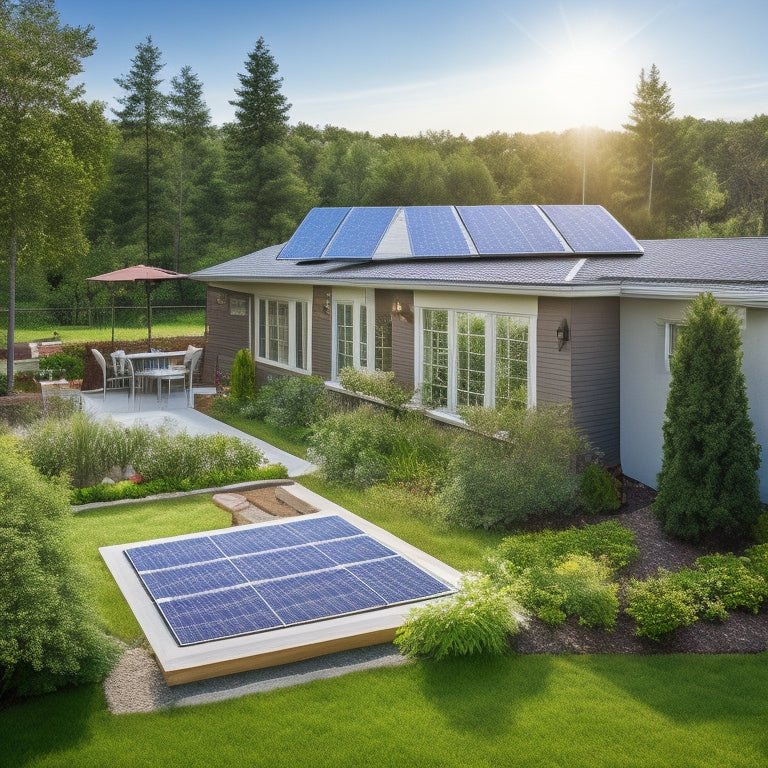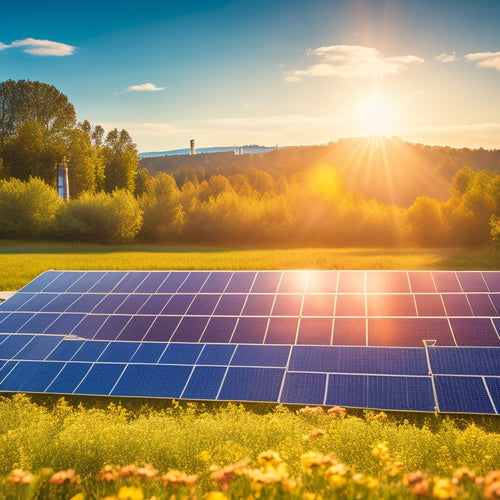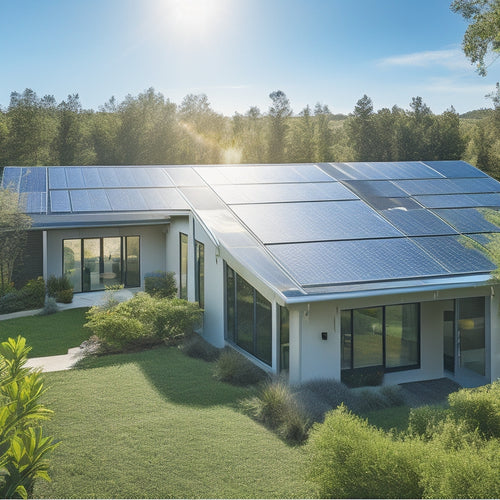
Why Choose High-Efficiency Panels for Home Power Systems?
Share
When setting up a home power system, you'll want high-efficiency panels to maximize energy output and reduce your carbon footprint. By choosing these panels, you'll boost energy production, minimize energy waste, and promote sustainable practices. You'll also make the most of your space and budget, as high-efficiency panels generate more power per unit area. Plus, they're designed to withstand environmental stressors and integrate seamlessly with smart home systems. As you explore the benefits of high-efficiency panels, you'll discover how they can enhance your energy solution and reveal even more advantages.
Key Takeaways
• High-efficiency panels increase energy output efficiency by up to 45% through optimized angles and tilt, maximizing energy harvesting capabilities.
• They reduce carbon footprint by minimizing energy waste, lowering emissions, and promoting sustainable practices and environmental stewardship.
• Compact design and high power output per unit area make high-efficiency panels ideal for homes with limited roof space and budget constraints.
• Durable and reliable high-efficiency panels withstand environmental stressors, corrosion, and extreme weather conditions, ensuring peak performance.
• They future-proof home power systems, seamlessly integrating with emerging technologies, smart home systems, and battery storage solutions for reliable backup power.
Boosting Energy Output Efficiency
By optimizing your solar panel angles and tilt, you can increase energy output efficiency by up to 45%, depending on your location and climate. This is pivotal in maximizing your energy harvesting capabilities, as even a slight deviation from the ideal angle can result in significant energy losses. Panel optimization is key to harnessing the full potential of your solar panels.
To achieve peak energy output, it's vital to take into account factors such as your location's latitude, the time of year, and the surrounding environment. By adjusting your panel's tilt and angle accordingly, you can ensure that your system is capturing the maximum amount of energy from the sun.
This is particularly important during periods of low sunlight, where every watt counts.
Reducing Carbon Footprint Effectively
As you maximize your energy output, you can further reduce your reliance on non-renewable energy sources, shrinking your carbon footprint in the process. By choosing high-efficiency panels for your home power system, you're not only generating more energy but also promoting sustainable practices and environmental stewardship.
Here are three ways high-efficiency panels help reduce your carbon footprint:
-
Less energy waste: High-efficiency panels convert more sunlight into usable energy, minimizing energy waste and reducing the need for non-renewable energy sources.
-
Lower emissions: By relying more on renewable energy, you're reducing your reliance on fossil fuels and lowering greenhouse gas emissions, contributing less to climate change.
-
Increased energy independence: With high-efficiency panels, you're generating more energy locally, reducing your reliance on the grid and the associated carbon emissions.
Maximizing Space and Budget
Optimizing your home power system's performance often boils down to striking a delicate balance between available space and budget constraints.
When it comes to maximizing space, high-efficiency panels are a game-changer. Their compact design enables you to generate more power per unit area, making them ideal for homes with limited roof space.
This means you can reap the benefits of renewable energy without sacrificing precious space.
Enhancing Durability and Reliability
Your high-efficiency panels' lifespan can be greatly extended by implementing protective measures against environmental stressors, guaranteeing your home power system remains reliable and efficient over time. By doing so, you can minimize the risk of premature degradation and secure peak performance.
To enhance durability and reliability, consider the following key factors:
-
Corrosion protection: Make sure your panels are designed with corrosion-resistant materials and coatings to prevent damage from environmental elements.
-
Weather resistance: Look for panels with advanced weather-resistant designs, such as sealed junction boxes and waterproof connectors, to withstand extreme weather conditions.
-
Thermal management: Opt for panels with built-in thermal management systems to regulate temperature and prevent overheating, which can lead to reduced efficiency and lifespan.
Future-Proofing Home Power Systems
To future-proof your home power system, you'll want to design it with flexibility and adaptability in mind, ensuring seamless integration with emerging technologies and evolving energy needs.
This means selecting high-efficiency panels that can effortlessly integrate with smart home systems, allowing you to monitor and control your energy usage in real-time.
As energy storage technologies continue to advance, a future-proofed system will enable you to easily incorporate battery storage solutions, providing a reliable and efficient backup power source during outages or peak usage periods.
Frequently Asked Questions
Can I Install High-Efficiency Panels Myself, or Do I Need a Professional?
Like a master painter, you envision a canvas of renewable energy, but installing high-efficiency panels yourself can be a recipe for disaster. DIY safety risks and an expertise gap can leave you in the dark, so it's best to call in a professional.
How Do I Determine the Ideal Panel Size for My Home's Energy Needs?
To determine the ideal panel size for your home's energy needs, you'll need to conduct an energy audit and perform a load calculation to assess your energy usage and identify areas of inefficiency.
Are High-Efficiency Panels Compatible With Existing Energy Storage Systems?
'As you navigate the shift to high-efficiency panels, you'll find they harmonize with existing energy storage systems, fostering system integration and energy synergy, allowing you to orchestrate a seamless, efficient power flow.'
What Maintenance Is Required to Ensure Optimal Panel Performance?
You'll need to perform regular panel cleaning to guarantee maximum energy harvesting, and monitor performance regularly to identify potential issues, using tools like data loggers and IV curve tracers to maintain peak efficiency.
Do High-Efficiency Panels Have a Longer Warranty Than Standard Panels?
You'll be surprised to know that 80% of solar panels still operate at 90% capacity after 25 years. When you opt for high-efficiency panels, you typically get an Extended Protection and Premium Guarantee, often up to 30 years, providing you with added peace of mind.
Related Posts
-

Advantages of Solar Generating Systems Over Traditional Energy
Solar generating systems provide several key advantages over traditional energy sources. You'll experience lower long...
-
Average Lifespan of Solar Battery Banks
The average lifespan of solar battery banks generally ranges from 5 to 15 years. This variation mainly stems from the...
-

Installing Metal Solar Roofs for Maximum Energy Efficiency
Installing metal solar roofs can drastically enhance your home's energy efficiency and durability. These roofs withst...

